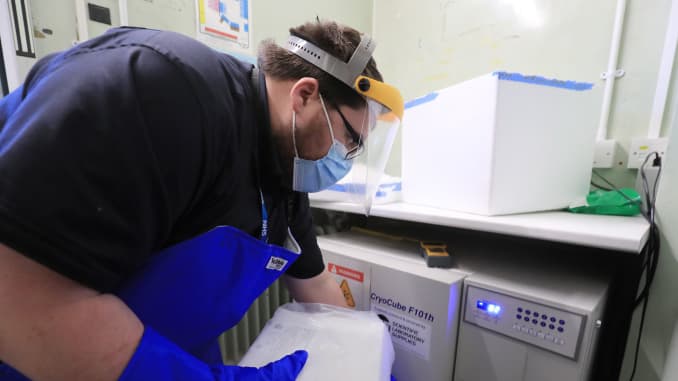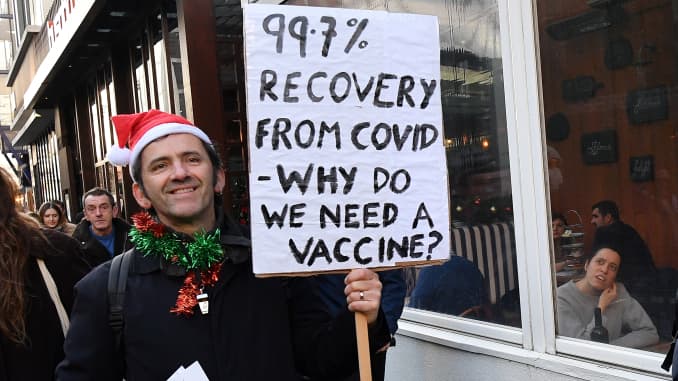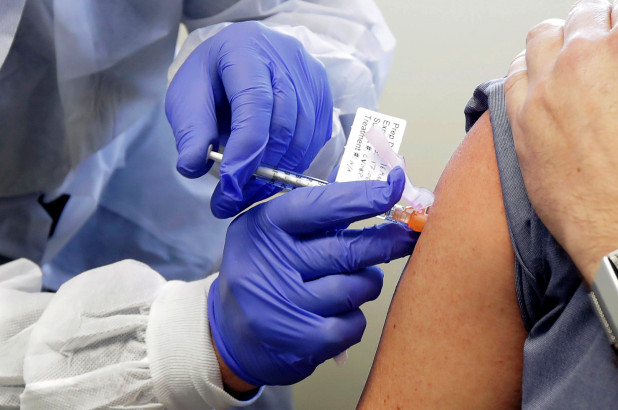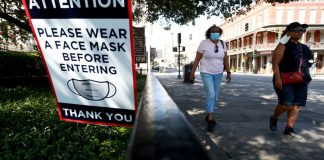KEY POINTS
- The U.K. is preparing to administer the first Covid-19 vaccines to the public on Tuesday, making it one of the first countries in the world to roll out a coronavirus vaccine.
- The first doses of the Pfizer/BioNTech shots, which gained emergency approval from the U.K. drug regulator last week.
- It will be given on Tuesday to frontline health workers, care home workers and those aged over 80.
The U.K. is preparing to administer the first Covid-19 vaccines to the public on Tuesday, making it one of the first countries in the world to roll out a coronavirus vaccine.
The first doses of the Pfizer/BioNTech shots, which gained emergency approval from the U.K. drug regulator last week, will be given on Tuesday to frontline health workers, care home workers and those aged over 80.
Prime Minister Boris Johnson called the rollout “one of the biggest civilian logistical efforts” the U.K. has ever faced. It will be the U.K.’s biggest vaccination drive ever.
British newspapers on Monday hailed it “V Day” and “Vaxit” (a play on “Brexit” — the other big news in the U.K. this week). Meanwhile, the U.K.’s top health officials are gearing the public up for the vaccination drive, with U.K. Health Secretary Matt Hancock stating on Sunday that “this coming week will be an historic moment as we begin vaccination against Covid-19.”
Professor Stephen Powis, the NHS’ national medical director, said that “despite the huge complexities, hospitals will kickstart the first phase of the largest scale vaccination campaign in our country’s history from Tuesday. The first tranche of vaccine deliveries will be landing at hospitals by Monday in readiness.”
‘I am so proud’
The rollout comes at a crucial time for the country; the U.K. has the third-highest number of coronavirus cases in Europe, after France and Italy, with over 1.7 million confirmed infections, and more than 61,000 deaths, data from Johns Hopkins University shows.
Fifty hospitals have been chosen to act as vaccine “hubs” in the U.K. and these will act as the primary place where the vaccines are administered. Later, the vaccine will be rolled out to community health centers, such as doctors’ surgeries, in order to facilitate a more general vaccination program, where the priority will depend on age and clinical need.
Croydon University Hospital in London was one of the first hospitals to receive batches of the vaccine this weekend.
“It’s just incredible actually,” Croydon Health Service’s Chief Pharmacist Louise Coughlin told reporters.
“Obviously I can’t hold them in my hands because they are minus 70 degrees, but to know that they are here and we are amongst the first in the country to actually receive the vaccine and therefore the first in the world is just amazing. I am so proud.”

The U.K. pre-ordered 40 million doses of Pfizer and BioNTech’s vaccine, which proved to be 95% effective at preventing Covid infection in late-stage clinical trials.
As it’s a two-dose vaccine, the country has bought enough doses to vaccinate 20 million people. Pfizer’s delivery of the vaccines will be staggered, with the total amount expected to have been delivered by the end of 2021.
Britain has also pre-ordered other Covid-19 vaccines from AstraZeneca and Moderna, but these are yet to be granted approval.
From security issues to public confidence
Pfizer confirmed to CNBC that the U.K. will first receive around 800,000 shots from its manufacturing hub in Puurs, Belgium. However, there is secrecy around the actual delivery schedule. “We can’t share any more on how or where it is coming into in the U.K. for security reasons,” a company spokesperson told CNBC in a statement.
Aside from security issues, there are other logistical challenges posed by the vaccine’s transportation and storage needs. The Pfizer/BioNTech vaccine can only be moved four times, has to be stored at minus 70 degrees Celsius (minus 94 degrees Fahrenheit), and once thawed, can only be stored at refrigerated temperatures for up to five days.
Another challenge for the government is public perception and participation in the vaccine program, amid the spread of anti-vaccine misinformation.
Last week, Professor Jonathan Van-Tam, the U.K.’s deputy chief medical officer, warned that a “low uptake” of the vaccine could mean a continuation of coronavirus restrictions, and possible further lockdowns.
“Nobody wants lockdowns and to see the damage they do,” he said during a government press conference. “But if you want that dream to come true (for life to go back to normal) as quickly as it can come true, then you have to take the vaccine when it is offered to you.”
Anti-vaccination rhetoric
Surveys have indicated that the British public is generally supportive of receiving a Covid vaccine, and it will not be compulsory, but some are wary about the breakneck speed with which the vaccine underwent testing, and was granted approval by the U.K.’s Medicines and Healthcare products Regulatory Agency.
“The vaccine is brilliant news, but I have my reservations about taking it yet given the short timeframe it has been in terms of testing,” one member of the public told CNBC in London.
“How safe is it? That’s the key question. What age group and demographics has it been tested on? I would like to see more testing before I take the plunge. I just need to be 100% sure that there won’t be an adverse effect, that nobody is yet aware of, because of the short duration of the testing.”

Andre Spicer, professor of organisational behaviour at Cass Business School in London, told CNBC Monday that building public confidence in the vaccine was a “huge issue” for governments.
“We know that anti-vaccination rhetoric is increasing and particularly during the Covid upswing,” he told CNBC’s Street Signs, adding that the typical way governments respond is “to provide information saying it’s safe, and you might also get leaders or influential people in a community to be seen taking the vaccine.”
“But there’s a lot of research to suggest that that does not tend to convince the most uncertain,” he said. “With those people you need to focus on people they actually know … like a family doctor or nurse,” Spicer added.
Vaccine development and approval can often take many years, but the devastating spread of the coronavirus pandemic has seen scientists race to find a way to stop the virus. The vaccine front-runners include those developed by Pfizer/BioNTech, Moderna and AstraZeneca, and the companies have reported that their shots were widely effective at preventing coronavirus infection in clinical trials.
The vaccine makers have insisted that no corners have been cut. The U.K. regulator was the first in the world to grant approval to Pfizer/BioNTech’s vaccine last week, with its European counterpart expected to announce its conclusions about the Pfizer vaccine later this month, and the Moderna vaccine in early January.
The U.S. Food and Drug Administration is holding a meeting Thursday where it is expected to discuss an emergency use application of Pfizer and BioNTech’s vaccine.




























